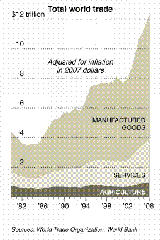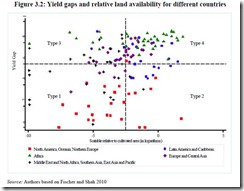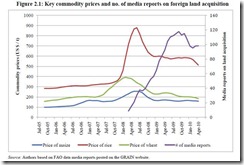This news from yahoo says so,
Deadly riots in the streets of Mozambique over sharply higher food prices have left 13 dead. Anger is growing in Egypt and Serbia as well. Panicked Russian shoppers have cleared the shelves of staple grains. And the devastating floods that have left as many as 10 million Pakistanis homeless are also raising concerns about the country's ability to feed itself.
A series of isolated disasters? Not at all. The common thread: extreme weather, which is putting pressure on food supplies around the globe.
Like any politically biased article, this seems focused on a post hoc fallacy (after this, therefore because of this) argument.
Extreme weather conditions has exacerbated but not caused the existing imbalances or shortages.
In almost every instance, shortages happens when the price mechanism isn’t allowed to function.
And because agriculture is one of the most, if not the most, politically sensitive sector in any economy, it has been the least open to international commerce, hence, the inherent imbalances from the lack of trade and investments which extrapolates to reduced output or the lack of supply. In short, supply constrains have been caused by government policies which has distorted the price mechanism.
This is especially accentuated in developing economies whom lacks capital to develop idle lands which has been aggravated by aforementioned protectionist measures.
Subsequently this has resulted to a massive loss in productivity from the underlying mismatch in the yield gaps and the land availability (abundance of fallowed lands) as shown below by the most recent World Bank Study Rising Global Interest In Farmlands.
Of course, the law of demand and supply has always been at work, such that in the recent episode where food prices spiked in 2007-8 combined with the recent trends of globalization, governments have used current dynamics to exploit on these gaps by allowing for crossborder investments (seen below).
So obviously the answer to the problem of shortages is to allow markets to function, which hopefully the du jour acceptance of globalization might diffuse openness into the world’s agriculture sector.
And of course, no one has been talking about the way global governments have been printing money which has been artificially boosting demand for food and obversely depreciating value of currency relative to real goods.
For the mainstream, what is NOT sensational but real, hardly matters.



No comments:
Post a Comment